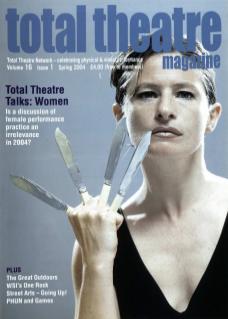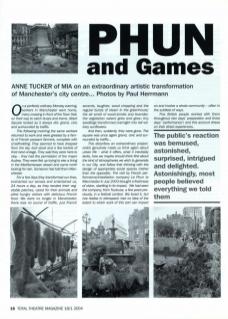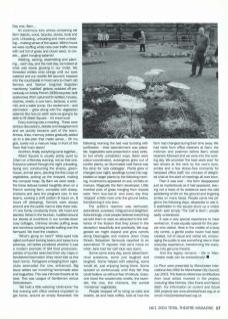On a perfectly ordinary Monday evening, workers in Manchester went home, many crossing in front of the Town Hall, on their way to catch buses and trams. Albert Square looked as it always did: grand, civic and surrounded by traffic.
The following morning the same workers returned to work and were greeted by a family of French peasant farmers, complete with smallholding. They seemed to have dropped from the sky, lock stock and a few barrels of their best vintage. They said they were here to stay, they had the permission of the mayor Audrey. They were fed up trying to eke a living in the Mediterranean desert and came north looking for rain. Someone had told them Manchester.
For a few days they transformed our lives, enchanted our senses and entertained us, 24 hours a day, as they tended their vegetable patches, cared for their animals and plied hungry visitors with delicious French food. We were no longer in Manchester; there was no sound of traffic, just French accents, laughter, wood chopping and the regular bursts of steam in the greenhouse; the air smelt of wood-smoke and lavender; the vegetarian salami grew and grew; tiny seedlings transformed overnight into tall willowy sunflowers.
And then, suddenly, they were gone. The square was once again grand, civic and surrounded by traffic...
This describes an extraordinary project, which genuinely made us think again about urban life – what it offers, what it inevitably lacks, how we maybe should think first about the kind of atmospheres we wish to generate in our City, and follow that thinking with the design of appropriate social spaces (rather than the opposite). The visit by French performance/installation company Le Phun to Manchester in July 2003 brought a freshness of vision, startling in its impact. We had seen the company, from Toulouse, a few years previously, in a festival context. We loved it, but (we realise in retrospect) had no idea of the extent to which work of this sort can impact on and involve a whole community – often in the subtlest of ways.
Five British people worked with them throughout ten days' preparation and three days' ‘performance') and this account draws on their direct experiences.
Day one, 8am...
An enormous lorry arrives containing old farm objects, wood, bicycles, stoves, tools and junk. Unloading, unloading and more unloading... making sense of the space. Within hours we were stuffing white nets over traffic cones with soil full of grass and clover seed, to create... giant hanging salamis!
Welding, sawing, assembling and planting... each day, and the next day, we looked at what was slowly growing in our midst. We threaded chillies onto strings until our eyes watered and our nostrils felt sauna'd; traipsed into the countryside in hired vans to charm old farmers and ‘borrow’ long-lost forgotten machinery; 'rustified' girders; wobbled off precariously on rickety French 1930s bicycles; built scarecrows (from upturned tin kettles), houses, cloches, sheds, a cow barn, terraces, a windmill, and a water pump. Our excitement – and admiration – grew along with the vegetarian salamis! But how on earth were we going to be able to fill Albert Square – it's enormous!
Every evening was a meeting. These were serious discussions, debate and disagreement and we quickly became part of the team. Arrows, lines, memory jotters gradually added up to a site-plan that made sense... Oh my god, surely not a manure heap in front of the Town Hall main doors!
And then, finally, everything came together…
Albert Square is usually pretty quiet by 10pm on a Monday evening, not so that one. Everyone worked through the night unloading laying soil, constructing the shacks, greenhouse, animal pens, planting the first crops of vegetables, putting up the vineyard, making the compost heap. By 8am we were ready – the three statues looked haughtily down on a French working farm, complete with sheep, chickens and Jane the pregnant cow. In two teams, working a shift pattern eight hours on, eight hours off (sleeping), farmers were always around and the public had no idea there wasn't one family constantly there. We hoed and planted, fished in the fountain, huddled around our stoves at lunchtime in our tumble-down cosy cottages, chimney smoke puffing away and wondrous cooking smells wafting over the farmyard. We lived the creation.
'What's going on here?' Wide-eyed kids ogled confused-looking beans and topsy-turvy parsnips, old ladies pondered whether it was a modem example of GM food production, parties of tourists searched their city maps in bewildered fascination (they never told us this back home). Partygoers emerging from nightclubs serenaded the cow, entranced. Big Issue sellers sat munching homemade stew and baguettes. This was intimate theatre at its best. This was League of Gentlemen versus Delicatessen.
The public's reaction was bemused, astonished, surprised, intrigued and delighted. Astonishingly, most people believed everything we told them
We held a little watering ‘cérémonie' the first evening with office workers impatient to get home, around an empty flowerbed; the following morning the bed was bursting with sunflowers – their astonishment was palpable. Vegetables were presented in crazy (artistic but wholly unrealistic) ways. Beds were colour-coordinated, aubergines grew out of conifer plants, an illuminated cold frame was the clinic for 'sick cabbages'. Plants grew or changed over night; seedlings turned into vegetables or larger plants by the following morning, mushrooms appeared on soil, orchids on manure. Magically the farm developed. Little inverted pots of grass hanging from tripods were from ‘Aus-tral-ia' and every day they 'dripped' a little more onto the ground below, transforming it into lawn.
The public's reaction was bemused, astonished, surprised, intrigued and delighted. Astonishingly, most people believed everything we told them or were so attracted to the brilliance of the illusion that they joined in the deception beautifully and poetically. We suggested we might expand and grow carrots along Deansgate and melons down Cross Street; Sebastien famously reported to an astonished TV reporter that we'd move on when Jane had her calf (due very soon).
Some came every day, some asked technical questions, some just laughed and laughed. Some helped with watering, some would sit, just enjoying being there. Some quizzed us continuously until they felt they could believe us without fear of ridicule. Everyone loved the woodsmoke smells, the lavender, the cow, the chickens, the surreal 'nonsense' vegetables.
People stopped off to bring us cake and snacks, sit and have coffee, look at how the farm had changed during their time away. We had visits from office cleaners at 5am; the milkmen and postmen before 8am; street cleaners followed and we were into the working day. We provided the ‘best week ever' for taxi drivers at the rank by the cow's byre, smiles and a few stress-free moments for harassed office staff, ten minutes of delighted chat at the start of meetings all over town.
Then it was over – the farm disappeared just as mysteriously as it had appeared, leaving not a trace of its existence save the odd splattering of dirt on the ground and lingering smiles on many faces. People came like pilgrims the following days, desperate to see it. A stallholder in the square stuck up a notice which said simply 'The Calf is Born'; people sadly understood.
It was a very special experience to have worked on. It was equally special for the people who visited. Here in the middle of a busy city centre, a gentle poetic haven had been created, full of visual and verbal wit, encouraging the public to see something new in their everyday experience, transforming the everyday into genuine theatre.
And the legacy remains – life in Manchester really can be extraordinary!
Le Phun were presented by Manchester International Arts (MIA) for Manchester City Council, July 2003. This feature references contributions from local artists involved in the project, including Ailsa Holmes, Cleo Evans and Naomi Bath. For information on current and future MIA projects see www.streetsahead.org.uk or email mla@streetsahead.org.uk


